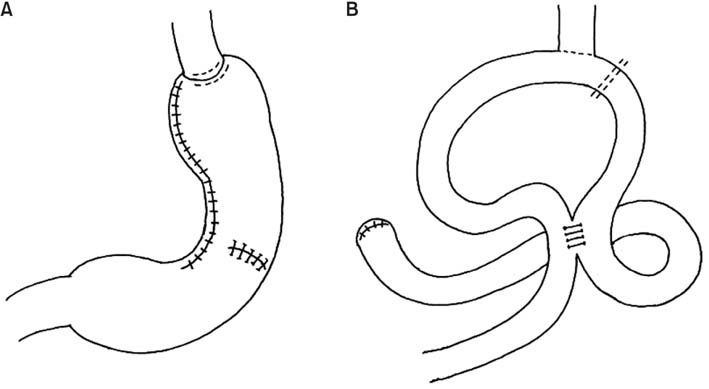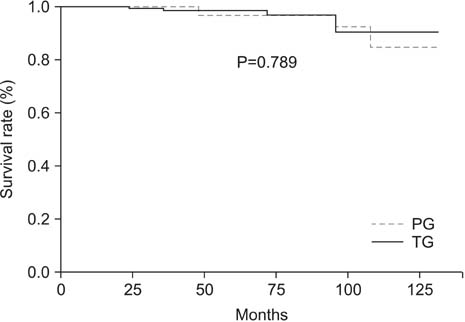J Gastric Cancer.
2014 Dec;14(4):246-251. 10.5230/jgc.2014.14.4.246.
Long-Term Outcomes of Proximal Gastrectomy versus Total Gastrectomy for Upper-Third Gastric Cancer
- Affiliations
-
- 1Department of Surgery, Soonchunhyang University Hospital Cheonan, Cheonan, Korea. msslee@schmc.ac.kr
- 2Department of Surgery, Soonchunhyang University Hospital Seoul, Seoul, Korea.
- 3Department of Surgery, Soonchunhyang University Hospital Bucheon, Bucheon, Korea.
- KMID: 2183648
- DOI: http://doi.org/10.5230/jgc.2014.14.4.246
Abstract
- PURPOSE
There are two surgical procedures for proximal early gastric cancer (EGC): total gastrectomy (TG) and proximal gastrectomy (PG). This study aimed to compare the long-term outcomes of PG with those of TG.
MATERIALS AND METHODS
Between January 2001 and December 2008, 170 patients were diagnosed with proximal EGC at Soonchunhyang University Cheonan Hospital, of which 64 patients underwent PG and 106 underwent TG. Clinicopathologic features, postoperative complications, blood chemistry data, changes in body weight, and oncological outcomes were analyzed and retrospectively compared between both groups.
RESULTS
Tumor size was smaller and the number of retrieved lymph nodes was lower in the PG group. The postoperative complication rate was 10.9% in the TG group and 16.9% in the PG group. The incidence of Los Angeles grade C and D reflux esophagitis was significantly higher in the TG group. Hemoglobin level was higher and body weight loss was greater in the TG group at 2, 3, and 5 years postoperatively. The albumin levels at 3 and 5 years were lower in the TG group. There was no significant difference in the 5-year overall survival rates between the two groups (P=0.789).
CONCLUSIONS
Postoperative complications and oncologic outcomes were observed to be similar between the two groups. The PG group showed better laboratory data and weight loss than did the TG group. Moreover, severe reflux esophagitis occurred less frequently in the PG group than in the TG group. PG can be considered as an effective surgical treatment for proximal EGC.
MeSH Terms
Figure
Reference
-
1. Jung KW, Won YJ, Kong HJ, Oh CM, Seo HG, Lee JS. Cancer statistics in Korea: incidence, mortality, survival and prevalence in 2010. Cancer Res Treat. 2013; 45:1–14.
Article2. Sim YK, Kim CY, Jeong YJ, Kim JH, Hwang Y, Yang DH. Changes of the clinicopathological characteristics and survival rates of gastric cancer with gastrectomy: 1990s vs early 2000s. J Korean Gastric Cancer Assoc. 2009; 9:200–206.
Article3. Ahn HS, Lee HJ, Yoo MW, Jeong SH, Park DJ, Kim HH, et al. Changes in clinicopathological features and survival after gastrectomy for gastric cancer over a 20-year period. Br J Surg. 2011; 98:255–260.
Article4. Hsu CP, Chen CY, Hsieh YH, Hsia JY, Shai SE, Kao CH. Esophageal reflux after total or proximal gastrectomy in patients with adenocarcinoma of the gastric cardia. Am J Gastroenterol. 1997; 92:1347–1350.5. Wen L, Chen XZ, Wu B, Chen XL, Wang L, Yang K, et al. Total vs. proximal gastrectomy for proximal gastric cancer: a systematic review and meta-analysis. Hepatogastroenterology. 2012; 59:633–640.
Article6. Lee MS, Nokes DJ, Hsu HM, Lu CF. Protective titres of measles neutralising antibody. J Med Virol. 2000; 62:511–517.
Article7. Japanese Gastric Cancer Association. Japanese gastric cancer treatment guidelines 2010 (ver. 3). Gastric Cancer. 2011; 14:113–123.8. Shiraishi N, Adachi Y, Kitano S, Kakisako K, Inomata M, Yasuda K. Clinical outcome of proximal versus total gastrectomy for proximal gastric cancer. World J Surg. 2002; 26:1150–1154.
Article9. Kitamura K, Yamaguchi T, Nishida S, Yamamoto K, Ichikawa D, Okamoto K, et al. The operative indications for proximal gastrectomy in patients with gastric cancer in the upper third of the stomach. Surg Today. 1997; 27:993–998.
Article10. Nakamura M, Nakamori M, Ojima T, Katsuda M, Iida T, Hayata K, et al. Reconstruction after proximal gastrectomy for early gastric cancer in the upper third of the stomach: an analysis of our 13-year experience. Surgery. 2014; 156:57–63.
Article11. Seshimo A, Miyake K, Amano K, Aratake K, Kameoka S. Clinical outcome of esophagogastrostomy after proximal gastrectomy for gastric cancer. Hepatogastroenterology. 2013; 60:616–619.12. Hoshikawa T, Denno R, Ura H, Yamaguchi K, Hirata K. Proximal gastrectomy and jejunal pouch interposition: evaluation of postoperative symptoms and gastrointestinal hormone secretion. Oncol Rep. 2001; 8:1293–1299.
Article13. Hoshikawa T, Denno R, Yamaguchi K, Ura H, Hirata K. Chronic outcome of proximal gastrectomy with jejunal pouch interposition in dogs. J Surg Res. 2003; 112:122–130.
Article14. Nakane Y, Michiura T, Inoue K, Sato M, Nakai K, Ioka M, et al. Role of pyloroplasty after proximal gastrectomy for cancer. Hepatogastroenterology. 2004; 51:1867–1871.15. Shemesh E, Czerniak A. Comparison between Savary-Gilliard and balloon dilatation of benign esophageal strictures. World J Surg. 1990; 14:518–521. discussion 521-522.
Article16. Okamura T, Tsujitani S, Korenaga D, Haraguchi M, Baba H, Hiramoto Y, et al. Lymphadenectomy for cure in patients with early gastric cancer and lymph node metastasis. Am J Surg. 1988; 155:476–480.
Article17. Kitamura K, Nishida S, Yamamoto K, Ichikawa D, Okamoto K, Taniguchi H, et al. Lymph node metastasis in gastric cancer in the upper third of the stomach: surgical treatment on the basis of the anatomical distribution of positive node. Hepatogastroenterology. 1998; 45:281–285.18. Kaibara N, Nishimura O, Nishidoi H, Kimura O, Koga S. Proximal gastrectomy as the surgical procedure of choice for upper gastric carcinoma. J Surg Oncol. 1987; 36:110–112.
Article19. Watanabe M, Iwatsuki M, Iwagami S, Ishimoto T, Baba Y, Baba H. Prognostic nutritional index predicts outcomes of gastrectomy in the elderly. World J Surg. 2012; 36:1632–1639.
Article20. Ryan AM, Healy LA, Power DG, Rowley SP, Reynolds JV. Short-term nutritional implications of total gastrectomy for malignancy, and the impact of parenteral nutritional support. Clin Nutr. 2007; 26:718–727.
Article21. Hu Y, Kim HI, Hyung WJ, Song KJ, Lee JH, Kim YM, et al. Vitamin B(12) deficiency after gastrectomy for gastric cancer: an analysis of clinical patterns and risk factors. Ann Surg. 2013; 258:970–975.22. Adachi S, Kawamoto T, Otsuka M, Todoroki T, Fukao K. Enteral vitamin B12 supplements reverse postgastrectomy B12 deficiency. Ann Surg. 2000; 232:199–201.
Article
- Full Text Links
- Actions
-
Cited
- CITED
-
- Close
- Share
- Similar articles
-
- Proximal Gastrectomy for Upper-third Early Gastric Cancer
- Long-term Results of Proximal and Total Gastrectomy for Adenocarcinoma of the Upper Third of the Stomach
- Laparoscopic Proximal Gastrectomy as a Surgical Treatment for Upper Third Early Gastric Cancer
- Analysis of Local Recurrence Following Proximal Gastrectomy in Patients with Upper Third Gastric Cancer
- Single-Port Laparoscopic Proximal Gastrectomy with Double Tract Reconstruction for Early Gastric Cancer: Report of a Case



